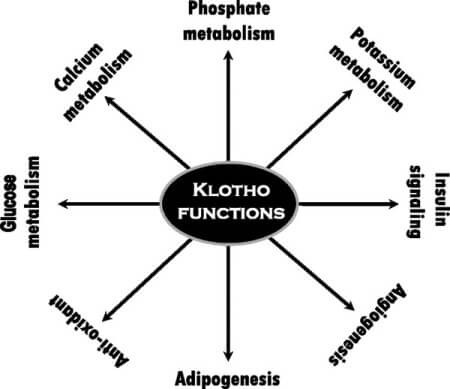
Klotho is a protein that plays a role in intelligence and longevity. Read on to learn about genetic and environmental factors that may increase it.
What is Klotho (Protein)?
Klotho is a protein that circulates in the blood and brain throughout life. It declines with age, in conjunction with cognitive deficits [1, 2, 3, 4].
According to some research, it plays a role in longevity [5, 6].
It also helps regenerate muscle (by inhibiting TGF) [7].
People with genetic variants with higher levels of Klotho had lower rates of heart disease in one study [8].
Klotho suppresses insulin and IGF-1 pathways in mice. It suppresses the production of biologically active vitamin D (decreases 1alpha-hydroxylase) [9, 10].
Klotho may also enhance antioxidant balance [11].
Mouse Studies on Klotho
The below findings should guide further investigational efforts, but they should not be interpreted as supportive of any health effect of Klotho protein in humans.
According to the observations of some researchers, some mice bred for higher levels of Klotho:
- Had increased lifespan (between 19% and 31%) [5]
- Were more resistant to oxidative stress [12]
- Performed better in multiple tests of learning and memory [5]
- Had better memory, indicated by more long-term potentiation, a form of synaptic plasticity [5]
- Had enhanced synapses and glutamate receptors [5]
- Doubled GluN2B levels (NMDAR subunit) in the mouse hippocampus [13]. GluN2B enhances cognition [14, 15, 16] and dysfunction of this subunit contributes to Alzheimer’s [13, 17].
According to other observations, some mice bred to have lower levels of Klotho experience:
- Early postnatal death [13]
- Less myelination [18]
- Synapse shrinkage [19]
- Cognitive impairment [20]
- Infertility [12]
- Osteoporosis [12]
- Accelerated aging [21]
- Heart disease [21]
- Impaired vessel Nitric Oxide, less vasodilation and angiogenesis [21]
- Increased production of Calcitriol/Active vitamin D and higher blood calcium and phosphorous, which might be the cause of premature aging in one study [10].
- Increased ADH and Aldosterone [22]. One study says that the excessive formation of Calcitriol in Klotho-deficient mice results in volume depletion outside cells, which contributes significantly to the shortening of life span [22].
Factors That Increase Klotho Levels
The role of Klotho protein in human health and disease is not fully clear. Improving your Klotho levels won’t necessarily cause health improvement of any kind.
The following is a list of factors and complementary approaches that may increase Klotho levels. Additional large-scale studies are needed before making any conclusions. Remember to talk to your doctor before making any major changes to your day-to-day routine.
- Exercise – in both humans and mice. Klotho only increases post-exercise in people who completed a 16-week training program, with younger people having a bigger increase than older people. Based on mouse studies, it’s believed that muscle injury and new muscle cells secrete Klotho [7].
- Vitamin D (Calcitriol) increases Klotho. However, Vitamin D supplements apparently don’t work in humans to increase Klotho, even when calcitriol goes up. In dialysis patients, vitamin D supplements actually decrease Klotho [23, 24, 25, 26].
- Insulin increases klotho. This is one downside to a really low carb diet [27].
- PPARgamma activators [12, 28].
- Activated charcoal by binding to a toxin that decreases klotho (Indoxyl sulfate) [29].
- Probiotics such as Acidophilus + L Lactis in aging mice [30].
- Cordyceps reverses the Angiotensin II decrease in klotho [31].
- Gentian root extract – might simply stabilize some part of the process after its production [32].
- ACE inhibitors
- Statins (HMG -CoA reductase inhibitors) – might simply stabilize some part of the process after its production [33, 34, 32].
Factors that Decrease Klotho
The following decrease klotho:
- Psychological stress and depression. Women under high chronic stress had low klotho compared with low-stress controls. Depressed people had even lower klotho levels [35].
- Inflammation [36]
- Oxidative stress (such as H2O2) [37]
- Angiotensin II [31]
- Indoxyl sulfate, a product of protein degradation [38, 39]
- In dialysis patients, vitamin D supplements decrease Klotho [26]
Klotho Genes and SNPs
If you have your genetic data sequenced, you can find out whether you have a high or low producing variation of the Klotho gene.
The most significant Klotho SNP is:





